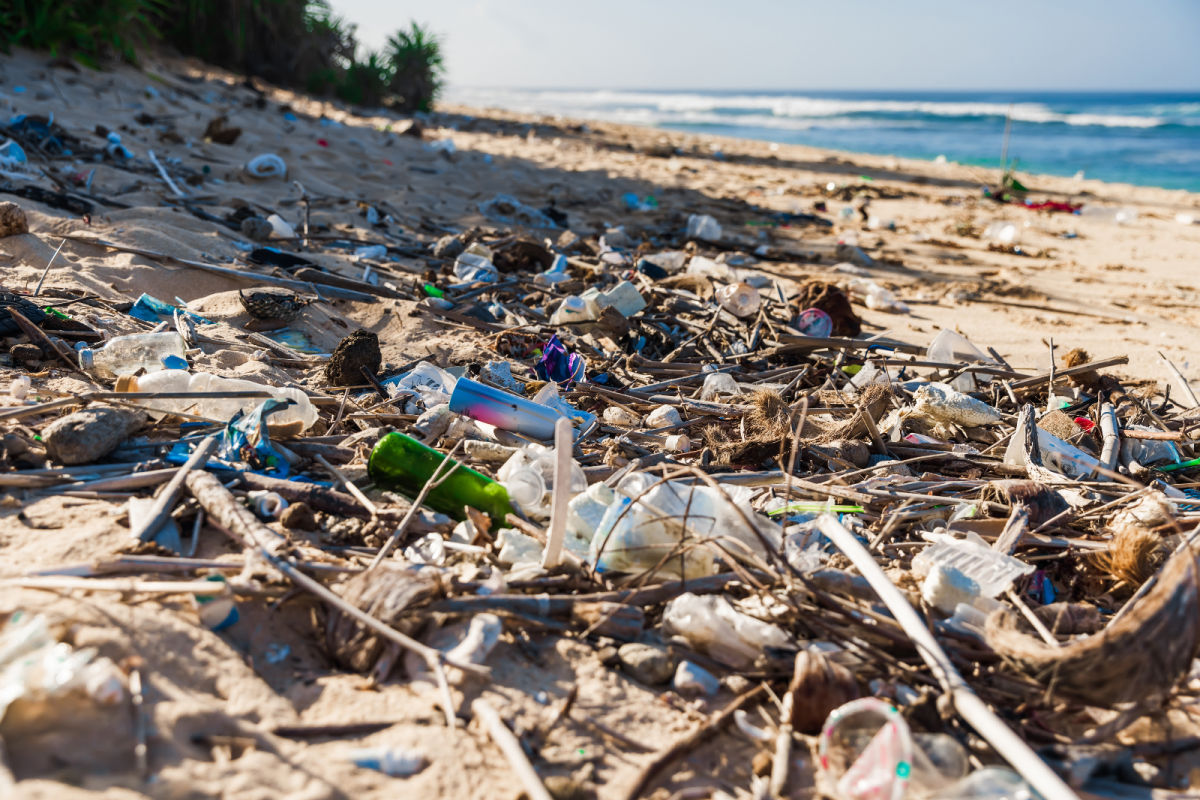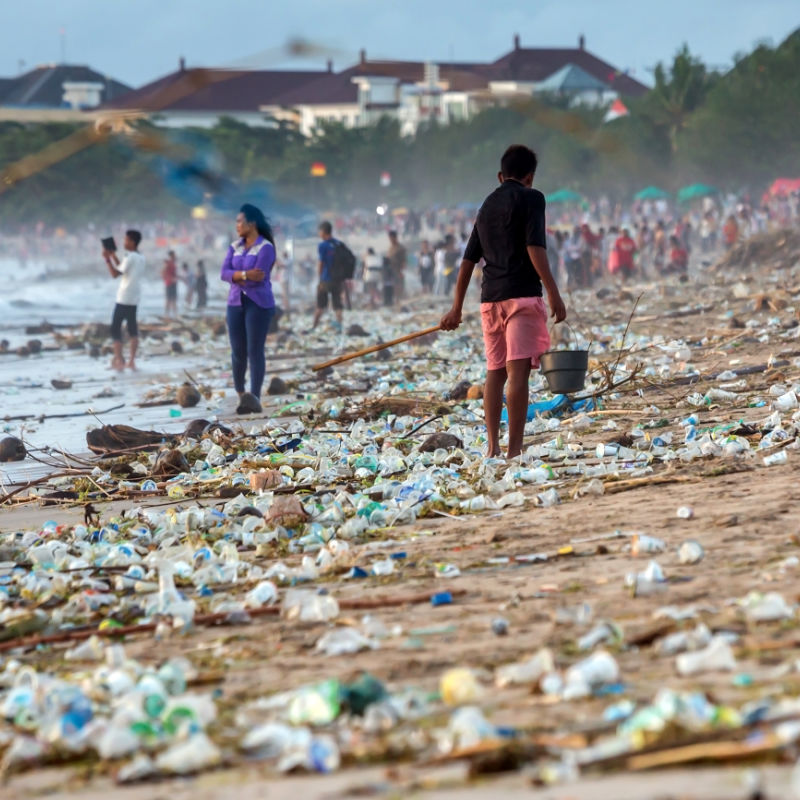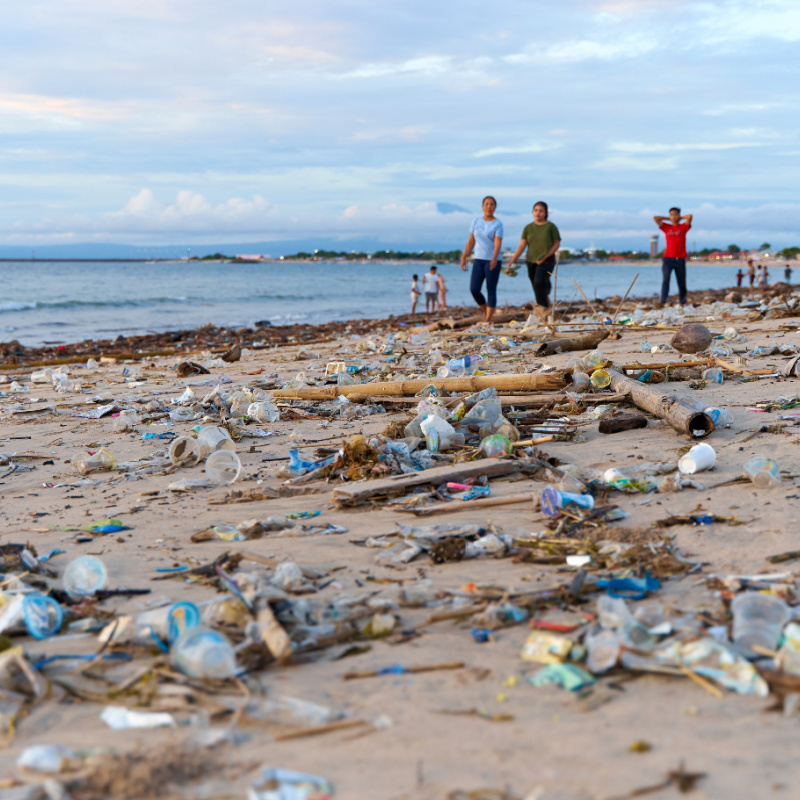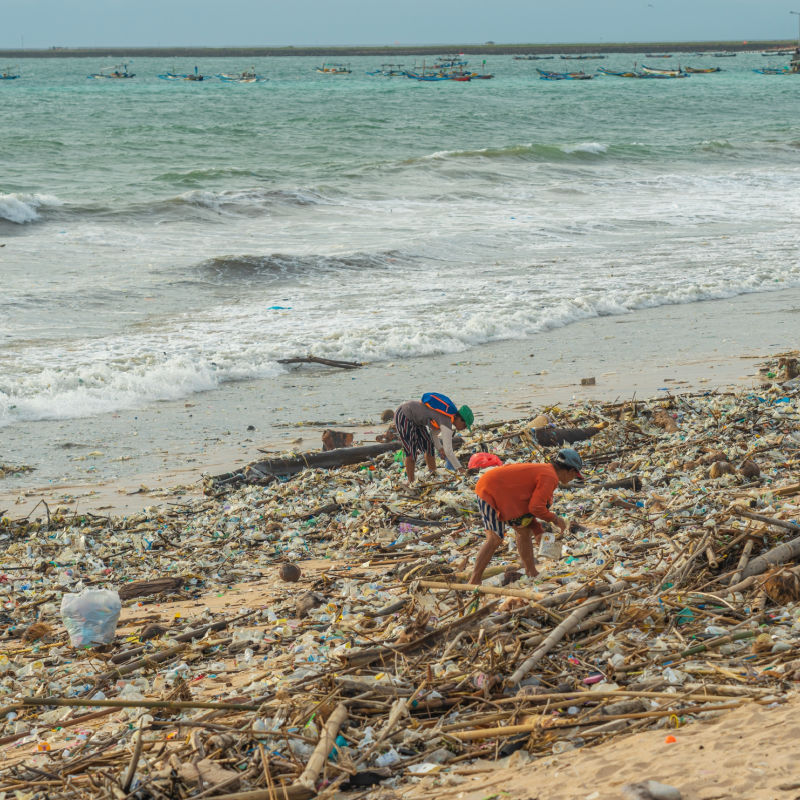The Indonesian Ministry of Tourism will accelerate the rollout of the Clean Tourism Movement 2025 in Bali.
The government-run program, which is already in operation in destinations like Lake Toba, Borobudur Mandalika, and Labuan Bajo, will help ensure that Bali’s top tourism destinations and attractions are clean and hygienic for visitors.

The response from the government comes after tides upon tides of plastic waste have been washing up on Bali’s most popular family-friendly beaches, from Kuta to Jimbaran.
Speaking to reporters from Kuta Beach during a community clean-up operation, top civil servant for the Minister of Crisis Management for the Ministry of Tourism, Fadjar Hutomo, explained that, in the eyes of the government, the seasonal trash tides have little to do with ‘less than optimal‘ waste management in the province.
Hutomo explained, “Geographically, Indonesia is currently experiencing a west wind season, and Bali is no exception. So, the garbage at Kuta Beach is garbage sent from the sea due to the season. Not because of the non-optimal waste handling,”
However, he did not deny that it is the responsibility of the national and provincial governments to improve the situation.
Hutomo explained, “Of course, waste handling is a part or domain of the Ministry of Environment, [and now] this correlates with the Ministry of Tourism. It is very significant because this is related to waste handling in tourism destinations, which has become an issue from year to year.”
Speaking to the media during the Kuta Beach Clean Up this weekend, the Minister of Environment, Hanif Faisol Nurofiq, explained, “We will supervise this shipment of waste in Kuta Beach until April. We will intervene with the support of tools and funding if necessary.”
Other top political figures also attended the Kuta Beach Clean Up, including the Regent of Badung and soon-to-be Deputy Governor of Bali, Nyoman Giri Prasta, the Indonesian Minister of Tourism, Widiyanti Putri Wardhana, and the Minister for Food of the Republic of Indonesia, Zulkifli Hasan.
Hasan praised the collective effort of the community and the authorities in coming together to respond to the recent tides of plastic waste that had been washed up in Kuta and around the central southern coast.
He shared, “I know that Bali has a strong philosophy, the Tri Hita Karana Philosophy, but of course, it cannot be done alone. As an archipelago with a very wide coastline, of course, cooperation is the key to maintaining our place.”

“This waste is an extraordinary problem if not addressed. Waste will disrupt the marine environment, disrupt public health, of course, disrupt tourism, and of course, disrupt food self-sufficiency because later there will be more waste than fish.”
Late last week, as a high tide receded on Kuta Beach, thousands of small fish were stranded on the shoreline, having been tangled in the ocean debris that had washed up on the beach.
Regent Prasta shared his gratitude for the united front and especially praised the Environment and Cleanliness Service (LHK) for their dedication.
He explained, “The existence of this activity reflects that the state is present in the midst of society in overcoming the problem of waste. The Badung Regency Government remains committed to overcoming and cleaning up waste in tourist destinations in Badung Regency.”

He concluded, “Once again, thank you to all parties, both from the TNI/Polri and environmental activists who have been maintaining the cleanliness of Kuta Beach.”
It was not only on Kuta Beach, where communities and authorities came together to clean up tons of plastic trash and ocean debris but on Kedonganan Beach and Jimbaran Beach, too. Led by environmental NGO Sungai Watch, the Emergency Clean Up ran in shifts over Saturday, 4th, and Sunday, 5th of January.

Speaking to reporters, Sungai Watch Community Manager Luh Putu Anggita Baruna Putri explained that the organization had connected 25 tons of waste between 24th – 31st December and that over the weekend, over 2,000 volunteers had come out to help.
She explained, “We also had a chat with local people here, around the last 30 years. This year, the garbage was the worst. So we really need the government’s help to implement the rules and seriously handle the waste problem because we can’t do clean-ups continuously every year.”
Remove All Ads & Unlock All Articles… Sign up for The Bali Sun Premium

Plan Your Bali Holiday:
Book The Best English Speaking Drivers For Airport Transfers & Tours
Choose From Thousands of Bali Hotels, Resorts, and Hostels with Free Cancellation On Most Properties
Book Cheap Flights To Bali
Don’t Forget Travel Insurance That Covers Medical Expenses In Bali
For the latest Bali News & Debate Join our Facebook Community
SUBSCRIBE TO NEW POSTS
Enter your email address to subscribe to The Bali Sun’s latest breaking news, straight to your inbox.
Discover more from The Bali Sun
Subscribe to get the latest posts sent to your email.

Sven
Wednesday 8th of January 2025
What do you mean by less than optimal waste management??? Are you seriously saying that this is an optimal waste management currently in place in Indonesia???
What is it exactly??
Putting all your garbage onto big pile all together (nothing sorted), so much that it has created the biggest garbage mountains on the planet??
Or burning it openly everywhere, horribly polluting the entire population in that country, and spreading that pollution to the world??
Throwing all this trash into forests, where the rain washes it down to the ocean, after which it covers the beaches all around Indonesia, and floats to neighboring countries??
Is that what these ministers consider as "optimal" waste management???
Can someone please start testing Indonesian politicians for drug use before they make public statements? Or test their IQ? Because such utter nonsense cannot come out of someone with a functioning brain.
Sven
Wednesday 8th of January 2025
"West wind season" means what? Trying to pretend that this crap comes from somewhere else in the world?
How come Thailand western coastline is clean?
How come most of this garbage is made of Indomie, Aqua and Es Teh packages?
This is your own garbage, not only in the ocean, but all the way up to mountainsides, roadsides, forests, thrown there by your own local ignorant people. Not only ignorant, but also arrogant, who often try to shift blame to others. Telling that this garbage comes from Java, or from tourists. It does not. It comes from dishonest and uncivilized Balinese.
Paul
Wednesday 8th of January 2025
It's impossible to educate the balinees as they don't listen much unless it's ceremony time
Rebekah
Tuesday 7th of January 2025
What education programs are being implemented in schools to educate locals about recycling ♻️ and what to do with their rubbish? As a tourist I definitely acknowledge the impact we all play in the vast problem but I also see locals throwing their plastic waste from motorbikes, cars and even when walking. Other countries have been implementing education for many decades to train people what to do to avoid fines for littering. These government led programs have worked overseas. As a teacher I encourage this education for all ages and particularly for the next generation currently in school.
Exp
Thursday 9th of January 2025
@James, Ha-ha. Exactly. These are the dudes the youngsters look up to. I can see next generation Balinese pile out of the schools, underage on motorbikes, no helmet, speeding, 3 on a bike and dropping their empty juice boxes on the road.
Foreigners are only tolerated for their money, not their advice on how to improve life here. Smart money go elsewhere.
James
Wednesday 8th of January 2025
@Rebekah, We did run multiple education programs. It's a waste of time 90% of the time. The elderly in most Banjars consider everyone who says that burning plastic is dangerous and polluting waterways is bad for the planet as "stupid" or "pussies". Especially when it comes from foreigners. They lit a cigarette while standing in the smoke of burning trash, pretending to be real tough man. Sure, we were able to reach some people, but the majority truly does not care. We stopped funding all those projects 2 years ago, since the results on Bali were just close to zero.
WAYAN BO
Tuesday 7th of January 2025
Remains of New Year Eves, next year again, the plastic fish was unforgettable 🤣